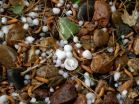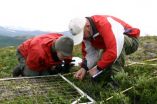(Press-News.org) Climate change is having a more profound effect on alpine vegetation than at first anticipated, according to a study carried out by an international group of researchers and published in Nature Climate Change. The first ever pan-European study of changing mountain vegetation has found that some alpine meadows could disappear within the next few decades.
Led by researchers from the Austrian Academy of Sciences and the University of Vienna, biologists from 13 different countries in Europe analysed 867 vegetation samples from 60 different summits sited in all major European mountain systems, first in 2001 and then again just seven years later in 2008. They found strong indications that, at a continental scale, cold-loving plants traditionally found in alpine regions are being pushed out of many habitats by warm-loving plants.
"We expected to find a greater number of warm-loving plants at higher altitudes, but we did not expect to find such a significant change in such a short space of time," said Michael Gottfried from the Global Observation Research Initiative in Alpine Environments (GLORIA) programme which coordinated the study. "Many cold-loving species are literally running out of mountain. In some of the lower mountains in Europe, we could see alpine meadows disappearing and dwarf shrubs taking over within the next few decades," he warns.
The study, which is the largest and most comprehensive of its kind in the world, confirmed that there is a direct link between growing summer temperature and the shift in alpine plant composition. "While regional studies have previously made this link, this is the first time it has been shown on a continental scale," said Gottfried. This phenomenon, which the GLORIA researchers have called thermophilization, has now been measured and quantified for the first time and is expressed by the researchers as a thermophilization indicator (D). All 32 of the study's authors used exactly the same sampling procedures and returned to the same sampling sites, thus enabling a pan-continental comparison to be made for the first time. "We hope that our thermophilization indicator could be used by other research groups around the world and enable a global comparison," said Harald Pauli, GLORIA's network coordinator.
The research also showed that the effect is independent of altitude (it is happening at the tree line as well as on high mountain peaks) and latitude (the effect is seen in northern countries such as Scotland as well as southern mountain ranges such those on Crete).
"Our work shows that climate change affects even the outer edges of the biosphere," said Georg Grabherr, chair of the GLORIA programme. "The thermophilisation of alpine life zones can never be controlled directly. Adaptation strategies are not an option and we must concentrate on mitigating climate change in order to preserve our biogenetic treasure."
INFORMATION:
About GLORIA
The GLORIA programme (Global Observation Research Initiative in Alpine Environments) is a network of more than 100 research teams distributed over six continents whose aim it is to monitor all alpine regions across the globe. Launched in 2001, it has implemented a long-term and standardised approach to the observation of alpine vegetation and its response to climate change. The GLORIA researchers will be returning to the same European sampling sites in 2015 to continue monitoring the effects of climate change on alpine vegetation.
Further details: http://www.gloria.ac.at/
Publication
Continent-wide response of mountain vegetation to climate change. In: Nature Climate Change, 8. Jänner 2012 (Online ahead of print)
DOI: 10.1038/NCLIMATE1329
Climate change is altering mountain vegetation at large scale
2012-01-09
ELSE PRESS RELEASES FROM THIS DATE:
'Couch potato pill' might stop heat stroke too
2012-01-09
We've all seen the story in the news before. Whether it's the death of a physically fit high school athlete at football training camp in August, or of an elderly woman gardening in the middle of the day in July, heat stroke is a serious, life-threatening condition for which there is no treatment beyond submersion in ice water or the application of ice packs to cool the body to a normal temperature.
But, in a new study published today in the journal Nature Medicine, scientists discovered what they believe is one of the first drugs to combat heat stroke. AICAR – an experimental ...
Colorado mountain hail may disappear in a warmer future
2012-01-09
Summertime hail could all but disappear from the eastern flank of Colorado's Rocky Mountains by 2070, according to a new modeling study by scientists from NOAA and several other institutions.
Less hail damage could be good news for gardeners and farmers, said Kelly Mahoney, Ph.D., lead author of the study and a postdoctoral scientist at NOAA's Earth System Research Laboratory in Boulder, Colo. But a shift from hail to rain can also mean more runoff, which could raise the risk of flash floods, she said.
"In this region of elevated terrain, hail may lessen the risk of ...
New test spots early signs of inherited metabolic disorders
2012-01-09
A team of scientists, led by researchers at the University of California, San Diego School of Medicine and Zacharon Pharmaceuticals, have developed a simple, reliable test for identifying biomarkers for mucopolysaccharidoses (MPS), a group of inherited metabolic disorders that are currently diagnosed in patients only after symptoms have become serious and the damage possibly irreversible.
The findings will be published online January 8 in the journal Nature Chemical Biology.
MPS is caused by the absence or malfunctioning of a lysosomal enzyme required to break down ...
Evolution of complexity recreated using 'molecular time travel'
2012-01-09
Much of what living cells do is carried out by "molecular machines" – physical complexes of specialized proteins working together to carry out some biological function. How the minute steps of evolution produced these constructions has long puzzled scientists, and provided a favorite target for creationists.
In a study published early online on Sunday, January 8, in Nature, a team of scientists from the University of Chicago and the University of Oregon demonstrate how just a few small, high-probability mutations increased the complexity of a molecular machine more than ...
Team finds a better way to gauge the climate costs of land use changes
2012-01-09
CHAMPAIGN, Ill. — Those making land use decisions to reduce the harmful effects of climate change have focused almost exclusively on greenhouse gases – analyzing, for example, how much carbon dioxide is released when a forest is cleared to grow crops. A new study in Nature Climate Change aims to present a more complete picture – to incorporate other characteristics of ecosystems that also influence climate.
"We know that forests store a lot of carbon and clearing a forest releases carbon dioxide into the atmosphere and contributes to climate change," said University of ...
Graphene reveals its magnetic personality
2012-01-09
In a report published in Nature Physics, they used graphene, the world's thinnest and strongest material, and made it magnetic.
Graphene is a sheet of carbon atoms arranged in a chicken wire structure. In its pristine state, it exhibits no signs of the conventional magnetism usually associated with such materials as iron or nickel.
Demonstrating its remarkable properties won Manchester researchers the Nobel Prize in Physics in 2010.
This latest research led by Dr Irina Grigorieva and Professor Sir Andre Geim (one of the Nobel prize recipients) could prove crucial ...
European mountain vegetation shows effects of warmer climate
2012-01-09
The decade from 2000 to 2009 was the warmest since global climate has been measured, and while localized studies have shown evidence of changes in mountain plant communities that reflect this warming trend, no study has yet taken a continental-scale view of the situation – until now.
With the publication of "Continent-wide response of mountain vegetation to climate change," scheduled for Advance Online Publication (AOP) in Nature Climate Change on 8 January, researchers from 13 countries report clear and statistically significant evidence of a continent-wide warming effect ...
EditCopyProof Launches Fresh Website Catering To Niche Copywriting Needs of Evolutionary Entrepreneurs
2012-01-09
Founder of EditCopyProof, Charlon Bobo, today announced the official launch of a new website featuring products and services specifically developed for evolutionary entrepreneurs. As one of only a few businesses worldwide addressing the specific needs of this market, Bobo is the only copywriter.
Affectionately known as the "conscious copywriter," Bobo enjoys the success of a worldwide clientele and a loyal following of evolutionary entrepreneurs; a quickly-emerging market. The term is a relatively new one, coming onto the business scene within the past year.
Evolutionary ...
2 genes affect anxiety, behavior in mice with too much MeCP2
2012-01-09
HOUSTON -- (Jan. 8, 2012) – The anxiety and behavioral issues associated with excess MeCP2 protein result from overexpression of two genes (Crh [corticotropin-releasing hormone] and Oprm 1 [mu-opioid receptor MOR 1]), which may point the way to treating these problems in patients with too much of the protein, said Baylor College of Medicine scientists in a report that appears online in the journal Nature Genetics.
Much of the work was done at the Jan and Dan L. Duncan Neurological Research Institute at Texas Children's Hospital.
MeCP2 is a "Goldilocks" in the protein ...
Global warming caused by greenhouse gases delays natural patterns of glaciation, researchers say
2012-01-09
GAINESVILLE, Fla. --- Unprecedented levels of greenhouse gases in the Earth's atmosphere are disrupting normal patterns of glaciation, according to a study co-authored by a University of Florida researcher and published online Jan. 8 in Nature Geoscience.
The Earth's current warm period that began about 11,000 years ago should give way to another ice age within about 1,500 years, according to accepted astronomical models. However, current levels of carbon dioxide are trapping too much heat in the atmosphere to allow the Earth to cool as it has in its prehistoric past ...



